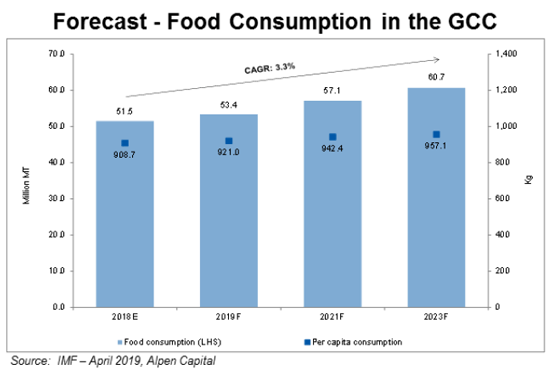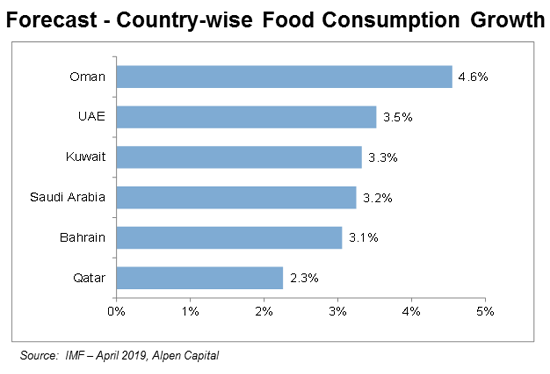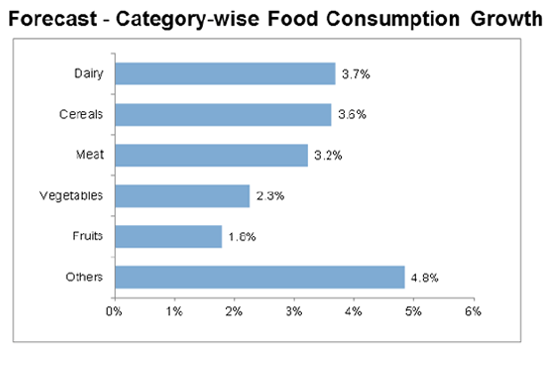The GCC food industry to witness steady and sustainable growth, forecasts Alpen Capital
Dubai, September 10, 2019
Alpen Capital (ME) Limited, Dubai-headquartered investment banking advisory firm, announced the publication of its report on GCC Food Industry for the year 2019. The report provides a comprehensive overview of the GCC food sector and outlines the recent trends, growth drivers and challenges in the sector. It also profiles some of the renowned food companies in the region.
“We anticipate the GCC food sector will continue to grow at a steady pace owing to factors such as growing population, higher per capita income, a vibrant tourism market and changing dietary habits and preferences. Upcoming MEGA events like EXPO 2020 and the FIFA World Cup 2022 are expected to further aid the growth of food consumption in the region. The food services industry continues to evolve with increasing penetration of food delivery channels and rising number of tech savvy millennials in the region.”, says Sameena Ahmad, Managing Director, Alpen Capital (ME) Limited.
“Over the next five years, we expect to witness a steady growth in the GCC food sector. Along with strong macro-economic variables, factors like changing demographics, increase in the number of working couples and growing influence of global culture are also supplementing growth of the food sector. Rising incidences of life style related diseases would continue to drive the demand for organic and healthy food items. Despite regional and economic challenges, we saw significant M&A activity take place in the sector during the past two years. Inherent demand for self-sustenance coupled with government initiatives and investments aimed at augmenting domestic productivity and food security, makes the region attractive for investors”, says Krishna Dhanak, Executive Director at Alpen Capital.
Industry Outlook
According to Alpen Capital, food consumption in the GCC is expected to grow at a CAGR of 3.3% from an estimated 51.5 million MT in 2018 to 60.7 million MT in 2023. Increase in population, growing tourism, high per capita income and a sustained economic recovery are likely to drive the growth of the food sector in the region.
Being the staple food of the region, cereals are expected to remain the most consumed food category with a share of 48.2% by 2023. Increasing demand for milk products will drive the growth of the Dairy sector and consumption of egg, fish, potatoes and fats & oil will contribute to the growth of the “Others” category. Consumption of healthy and organic food is likely to increase with growing awareness. However, the respective share of most food categories in the overall consumption is anticipated to remain broadly unchanged.

The country-wise food consumption share in the GCC is projected to largely remain unchanged through 2023. Saudi Arabia and the UAE are expected to remain the largest food consuming nations with their combined share of around 81% by 2023. Oman is expected to experience the fastest annualized growth at a CAGR of 4.6%.
The food consumption for the UAE and Saudi Arabia is estimated to reach 10.3 million MT and 39.0 million MT by 2023, respectively. The forecasted growth rates largely reflects the population and GDP projections for the countries.


Growth drivers
Rapid Population Growth and Rising Urbanization: The GCC population is forecasted to grow at a CAGR of 2.3% during 2018-2023 to reach 63.4 million in 2023, thus adding 6.8 million individuals. An expanding consumer base will drive the growth in food consumption in the region. Increasing urbanization and a growing affluence of expatriates continue to drive the demand of packaged and international food.
Increasing Awareness of Healthy Eating Habits: Due to high prevalence of lifestyle diseases in the region, there is a growing awareness of healthy eating habits, which has boosted the demand for organic food and food items that are sugar &fat free, low in salt, and with no preservatives.
Increasing Investment to Boost Tourism: The GCC countries are devoting increasing levels of attention to tourism in an ongoing effort to diversify their oil based economy. Collectively, they hosted about 38 million international tourists in 2017, which is seen as one of the key factors driving food consumption. Most of the countries are hosting seasonal events including sports, shopping festivals, recreational facilities and exhibitions with an aim to boost tourism in the country.
Flourishing Food Services Sector: The food services sector is estimated to witness a better-than-expected outlook on account of various international events, increasing deal activity and investments in the sector. The sector is expected to grow at a CAGR of 8.4% annually until 2023.
Challenges
Due to unfavourable climate, limited water resources and arable land in the region, the GCC countries import around 85% of the total food consumed. This has exposed the region to food price fluctuations and any adverse changes in the socio-political environment in the source countries and vital trade routes could pose a threat to GCC food imports.
The recent economic slowdown in the GCC due to decrease in oil prices as well as the ongoing global trade disruption has widened the uncertainties and fiscal deficit of the GCC economies. Governments’ measures to rationalize expenses and boost income have influenced the consumer sentiment in the countries. Some governments have introduced VAT thus indirectly affecting the food sector.
Trends
Growth of Packaged Food Remains Intact: A high expatriate population, rising number of working couples and hectic lifestyles are driving demand for packaged food in the GCC.
Growing Private Label Segment: Growing popularity of modern retailing has strengthened the demand of private label products. As consumers become more price sensitive, retailers including large supermarkets, hypermarkets and even discounters continue to invest in private labels, which have emerged as an important source of revenue with high margins.
Shifting Food Preference towards a Healthy Lifestyle: High levels of obesity and increasing health awareness in the region continue to augment the demand for healthy and organic food.
Increased Focus on Food Processing Segment: An increasing number of companies are investing in major food processing facilities within the GCC. In addition to local producers, many international firms are also building facilities to serve the regional market.
Digital Innovations Driving Food Distribution Efficiencies: Technology is re-defining the F&B sector in the GCC as the rising youth population is more tech-savvy and values the access to information and convenience along with the experience.
Growing Attention on Food Security: To reduce dependency on imports and build a sustainable supply, the GCC countries are looking at ways to boost the domestic food production by investing in modern agriculture methods like aquaculture, hydroponics and vertical farms. Some of the countries are also investing in overseas farmlands.
The GCC’s demographics and robust macro-economic factors are expected to continue to bolster its food industry. Due to the inherent growth potential of the industry coupled with increasing investments towards food security by the regional governments, significant M & A activity is projected to take place in the sector.
Please click here to access the GCC Food Industry Report online.
 Back
Back